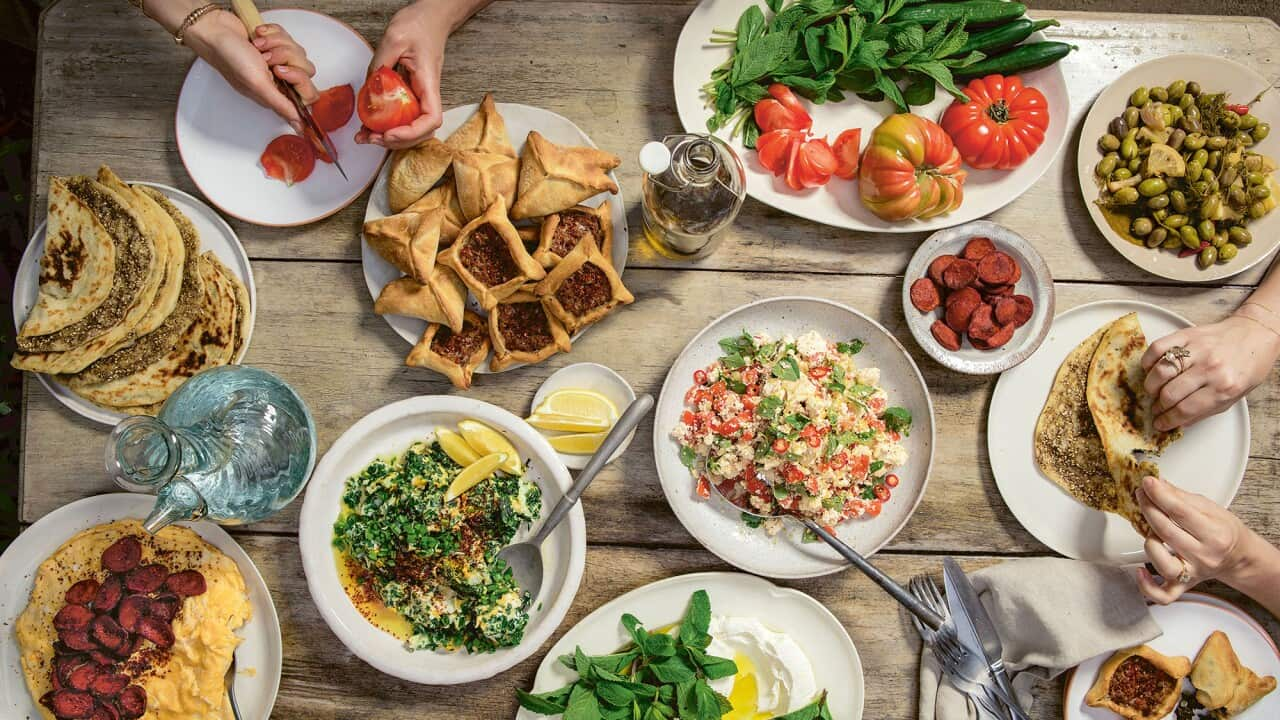Karima Hazim Chatila would love us all to discover the joy of gathering to cook together.
“That's how we cook as Arabs and as Lebanese people - you never go to someone's house for Sunday lunch and just sit at the table. You go into the kitchen, you roll your sleeves up and you find something to do. You go half an hour early to make sure that you're part of that journey with the host. That's something that is very natural for us, and I think it's a really beautiful concept for people.
So, if you are thinking about hosting and wanting to sit and put on a spread, that is something you can do – invite your guests a little bit early and welcome them into the kitchen and give them a job,” the cookery teacher says, when SBS Food talks to her about the inclusive spirit of Lebanese cooking that is a key theme of her new book, .

Karima Hazim Chatila (right) with her mother, Sivine Tabbouch. Credit: Hardie Grant Books / Luisa Brimble
The name of the book comes from a word that, at its simplest, means a table or a cloth prepared for food. But it represents so much more. “Sofra is a word that we would use every day. I'd say to my daughter, ‘go and put this on the sofra’, which is, go and put this on the table. Or you could use it as, ‘I want you to come and sit down on the sofra’. That's a table full of food. So, it has a very literal meaning, and it also has a very an emotive meaning, being a place to look forward to,” she explains.
“It's not just a table that has plates and cutlery and something on there. It's a meeting place. The sofra on the weekend was what we looked forward to the most, what you strived for whilst you were grocery shopping and prepping the day before, prepping that morning. It's that moment when everybody's assembled around and sitting down. You just look at this glowing table, and that's your sofra.” Big gatherings like these – a Sunday meal with members of her family and her in-laws where it isn't unusual for 30 or more people coming together – are a way of connecting with the culture they hold dear.
You arrive at this table, and you've got common ground now with everyone ... it's a beautiful reset for the week ahead
“It’s restorative, too“, she says. “Everybody's coming from a completely different week, you've got multiple generations around the table, so everybody's had a very sort of different lead up to Sunday lunch, and then you arrive at this table, and you've got common ground now with everyone. You've got all the week sort of in the past, and it's a beautiful reset for the week ahead.”
By organising the book into menus for different spreads, each with a group of dishes that go well together not just for serving, but in preparation too (and with a timeline for each to make it easy to plan and prep ahead), the mother-daughter duo hopes to encourage others to create these kinds of beautiful feasts, as they do in their cooking classes in Sydney.

Making stuffed vine leaves. Credit: Hardie Grant Books / Luisa Brimble
One such special dish is stuffed . ”That's a very relaxing, therapeutic, mindful, playful activity. And that's definitely something that we do with multiple hands. It's quite rare that anyone would sit and roll by themselves,” Karima says. It's definitely something that you would invite [people] and do a bit of a call out and say, ‘Would you like to come over and roll some vine leaves together’ and you put some music on and get chatting.”
Likewise, her mother’s buttery, hand-folded date shortbread biscuits or bascot bil tamer.

Bascot bil tamer (date shortbread). Credit: Hardie Grant Books / Luisa Brimble
“So, everything's in the kilos. It's never 'I'll just make a batch' or 'I'll just make a dozen and I'll be done'. I remember my editor saying, ‘so is anything in this book a dozen pieces?’ or and I said, we just don't cook like that. And it's not because we love to overindulge, it's because we love to share. We can't fathom the idea of making biscuits and not giving some to someone. I would never just make a batch and just have them at home. I'd think about my mother-in-law, and my father-in-law loves them, and my neighbour Mary loves them, and so and so.”
While the biscuits are a special occasion recipe, many of the other dishes – like the (meat pastries) – are the kind you’d see at any of her extended family’s weekend gatherings.

Lahem bi ajin (meat pastries). Credit: Hardie Grant Books / Luisa Brimble
“Usually, they're not very open people where they sit down and tell you how came to Australia, their struggles and what they've gone through. We don't like to talk about this kind of stuff. But when you're in the kitchen together for two or three hours and doing a very repetitive process, things just start to come out. Stories just start to flow. That's really special.”
You can also see Karim and Sivine talking food in these episodes of The Cook Up with Adam Liaw:
Stream free On Demand

Lebanese
episode • The Cook Up with Adam Liaw • cooking • 25m
G
episode • The Cook Up with Adam Liaw • cooking • 25m
G
Stream free On Demand

Sunday Lunch
episode • The Cook Up with Adam Liaw • cooking • 25m
G
episode • The Cook Up with Adam Liaw • cooking • 25m
G
Find their Cook Up recipes here

Dressed Lebanese sausages




